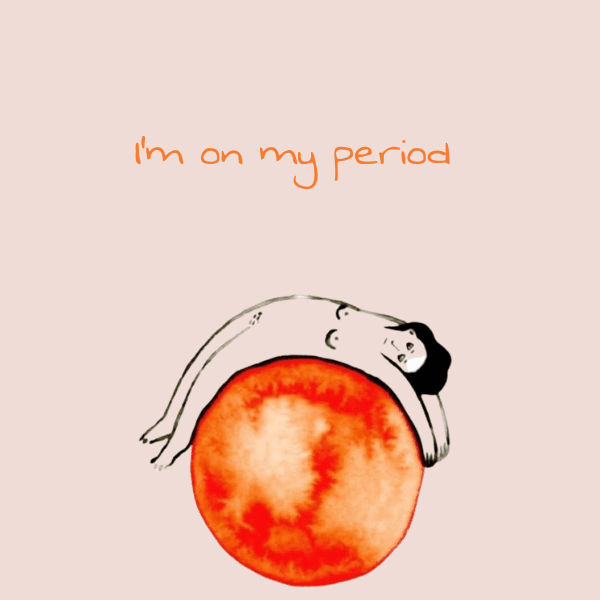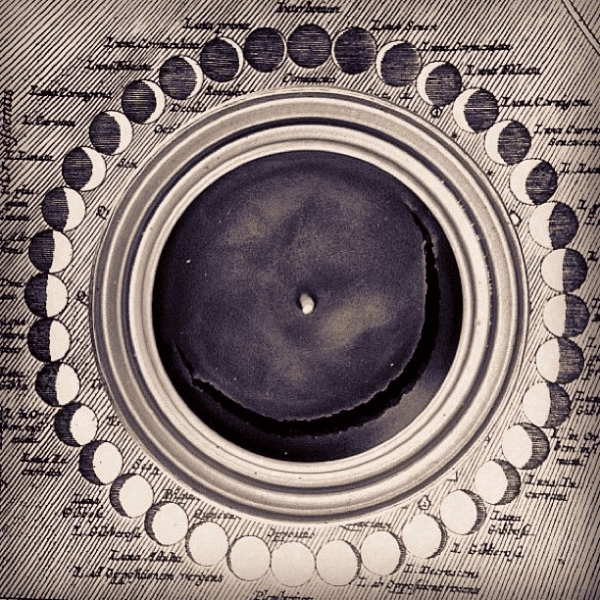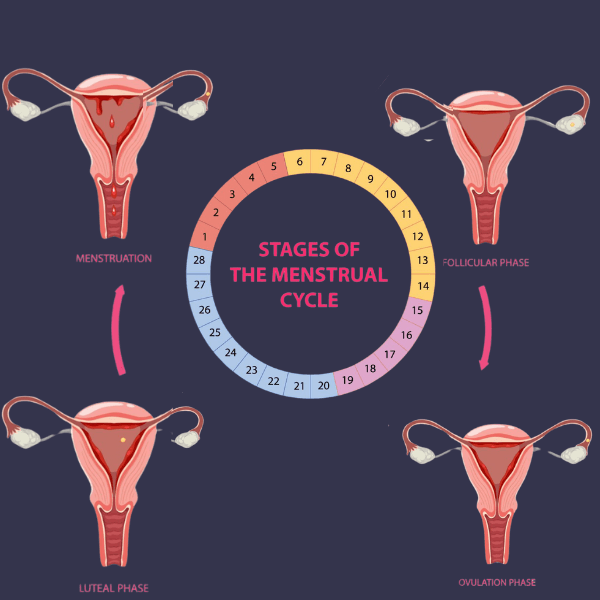The menstrual cycle phases sacredly dance with the moon, embarking on a journey through transformation and introspection. Each phase is a chapter in this mystical narrative, inviting you to align with the celestial rhythms and the Earth’s whispering secrets. Let us embark on this magical journey, discovering the unique energies and rituals that accompany each phase of your cycle.
Determining Your Menstrual Cycle Phase

To easily determine which phase of the menstrual cycle you are in, consider the following steps:
- Track Your Cycle Length: Begin by tracking the length of your menstrual cycle, counting from the first day of your period (the day bleeding starts) to the day before your next period starts. The average cycle is 28 days, but it can vary from person to person.
- Divide into Phases:
- Menstrual Phase (Days 1-5): This phase starts on the first day of your period.
- Follicular Phase (Days 1-13): This overlaps with the menstrual phase, starting on day 1 and ending just before ovulation. It’s longer in longer cycles.
- Ovulation (Day 14): In a 28-day cycle, ovulation typically happens around day 14. For longer or shorter cycles, calculate by subtracting 14 days from your total cycle length.
- Luteal Phase (Days 15-28): This phase begins post-ovulation and lasts until your next period.
- Monitor Your Body’s Signs: Pay attention to physical signs like changes in cervical mucus, basal body temperature, and ovulation pain, which can give clues about your phase.
- Use a Calendar or App: Utilize a menstrual cycle calendar or app to help keep track of these phases and predict future cycles.
By tracking your cycle length and observing your body’s natural signs, you can more accurately identify your current menstrual phase. This knowledge can empower you to align with your body’s natural rhythms.
Menstrual Cycle Phases and Hormones

The menstrual cycle can significantly impact the female body’s metabolic processes, as evidenced by changes in amino acids, lipids, and other biochemical markers during different phases. Specifically, during the luteal phase of the menstrual cycle, a notable decrease in amino acid and lipid concentrations is observed. This reduction is statistically significant compared to other phases of the cycle. In contrast, vitamin D and pyridoxic acid levels tend to increase during the menstrual phase. The study also found rhythmic changes in plasma and urine acylcarnitines, with a trend toward an increase in the periovulatory phase. These findings highlight the complex and dynamic nature of metabolic changes throughout the menstrual cycle (1).
Menstrual Phase (Days 1-5): Moon Swings

- Hormonal: This phase starts with the shedding of the uterine lining, marked by a drop in estrogen and progesterone levels.
- Physical: Common physical effects include menstrual cramps, bloating, headaches, and general fatigue. Some women also experience lower back pain.
- Psychological: Mood swings, irritability, and feelings of sadness or emotional sensitivity can be more pronounced due to hormonal fluctuations.
As the moon retreats into darkness, the menstrual phase begins, a time for release and purification. In this phase, your body and spirit align with the moon’s waning energy, inviting introspection and letting go. Ritual: Create a sacred space with candles and incense. As you sip moon water, envision releasing anything that no longer serves your highest good. Embrace gentle yoga poses that honor your body’s need for rest and rejuvenation.
Follicular Phase (Days 1-13): The Awakening Bloom

- Hormonal: Estrogen levels begin to rise, stimulating the lining of the uterus to thicken in preparation for potential pregnancy.
- Physical: Many women experience an increase in energy and a reduction in the severity of menstrual symptoms as this phase progresses.
- Psychological: There’s often an uplift in mood and cognitive function, with increased feelings of well-being, due to rising estrogen levels.
With the moon’s waxing light, the follicular phase unfolds, symbolizing growth and renewal. Your body awakens, preparing for what may come, just as seeds stir beneath the earth. Ritual: Plant a physical or metaphorical seed representing your intentions for this cycle. Nurture it with affirmations and water it with hope. Engage in creative activities like painting or writing to express the blossoming energy within you.
Ovulation (Day 14): The Firefly Waltz

- Hormonal: A surge in luteinizing hormone (LH) triggers the release of an egg from the ovary. Estrogen peaks just before ovulation, and testosterone also sees a slight increase (1).
- Physical: Some women may experience mild pelvic or abdominal pain (known as mittelschmerz), increased cervical mucus, and heightened senses.
- Psychological: This phase is often associated with increased libido, greater confidence, and an overall sense of being more sociable or extroverted.
As the moon reaches its zenith, the ovulatory phase brims with vibrant energy. This is a time to celebrate your creativity and passion. Ritual: Host a dance under the stars, letting your body move in harmony with the universe. Craft a talisman that represents your creative power, infusing it with your dreams and aspirations.
Luteal Phase (Days 15-28): The Savage Garden

- Hormonal: After ovulation, estrogen levels drop and progesterone rises to prepare the uterus for a potential pregnancy. If pregnancy does not occur, both hormones will decrease significantly.
- Physical: Common symptoms include breast tenderness, bloating, and changes in appetite or food cravings. Some women experience premenstrual syndrome (PMS).
- Psychological: The luteal phase can lead to mood swings, irritability, anxiety, and, in some cases, symptoms of premenstrual dysphoric disorder (PMDD), a more severe form of PMS.
Aligned with the full moon’s luminous energy, the luteal phase is a transformative period. This is a time to reflect deeply, as the decrease in amino acids and lipids casts a spell of introspection. Ritual: Create a potion of calming herbs like lavender or chamomile. As you drink, meditate on the lessons learned and wisdom gained. Write down insights and dreams, using them as seeds for future cycles.
The Pre-Menstrual Phase: The Twilight Whisper

In the pre-menstrual phase, as the moon wanes once more, it’s a time to prepare for the cycle’s end. This is a period of reflection, tying together the lessons of the past cycle. Ritual: Light a purple candle to symbolize transition and write in your journal. Reflect on the journey you’ve taken, acknowledging the growth and changes within.
Remember, these effects can vary greatly among individuals. Some women experience these symptoms strongly, while others may have a very different experience or barely notice these changes. It’s important to understand that these variations are normal.
Harmonizing with the Cycle

Each phase of your menstrual cycle is an opportunity to connect deeply with the natural world and your inner self. Embrace simple yet powerful rituals to honor these phases:
- Menstrual Phase: Focus on restorative yoga and meditation.
- Follicular Phase: Channel your energy into artistic or creative endeavors.
- Ovulatory Phase: Engage in joyful and energetic activities.
- Luteal Phase: Indulge in self-care and introspection.
Daily Activities Aligned with Menstrual Cycle Phases
Choosing the right phase of your menstrual cycle for important actions can be beneficial. Remember, these are general suggestions and can vary based on individual experiences and cycle variations.
Menstrual Phase Routine

- Rest and Relaxation: Your body needs more rest during this time, so prioritize sleep and relaxation.
- Light Exercise: Gentle activities like walking, yoga, or stretching can help with menstrual discomfort.
- Hydration: Drinking plenty of water is crucial during menstruation to stay hydrated.
- Healthy Eating: Focus on nourishing foods rich in iron and vitamins to replenish what your body loses during menstruation.
- Self-Care: Engage in activities that make you feel comfortable and cared for, like warm baths or reading a good book.
These activities are geared towards supporting your body and mind during the menstrual phase.
Follicular Phase Routine

- Resolving Conflicts: After menstruation, in the early follicular phase, when you might feel more patient and clear-headed.
- Cleaning and Organizing: The days immediately following your period can be great for organizing and decluttering, as energy levels start to rise.
- Joining Social Groups or Classes: The follicular phase is great for trying new things and meeting new people, thanks to the surge in energy and open-mindedness.
- Casual Hangouts: Right after your period, in the early follicular phase, when you might feel rejuvenated and ready for light, fun activities.
- Decision Making: The days just after your period (follicular phase) might be the best for clear thinking and making important decisions.
- High-Intensity Exercise: Best during the follicular phase (days 1-13) when energy levels are higher.
- Deep Learning or Study: Early follicular phase, when concentration levels are typically higher.
- Beginning a Hard Project: The follicular phase (days 1-13) is ideal for starting new projects, as energy levels and cognitive function are often higher.
- Starting a Diet or New Nutrition Plan: Begin during the follicular phase when you might feel more motivated and energetic.
- Starting a New Relationship: The follicular phase, with its increased energy and optimism, is ideal for new beginnings.
Ovulatory Phase Routine
- Creative Work: The ovulatory phase is great for creativity due to the peak in energy and communication skills.
- Socializing: The ovulatory phase, due to increased sociability and confidence.
- Having a Baby: The best time for conception is during ovulation, typically around day 14 in a 28-day cycle. This is when you’re most fertile.
- Going on Holiday: The ovulatory phase (around day 14) is often a good time, as many experience a peak in energy and mood.
- Negotiating or Asking for a Raise: The ovulatory phase is ideal due to increased confidence and communication skills.
- Important Conversations: Best during the ovulatory phase when communication skills are heightened.
- Adventurous Dates: The ovulatory phase is great for adventurous, energetic outings due to high energy levels.
- Hosting Events or Parties: The ovulatory phase is ideal due to increased energy, sociability, and confidence.
Luteal Phase Routine

- Relaxation and Reflection: The luteal phase (days 15-28) is a good time for relaxation and self-care, as energy may wane.
- Meditation and Yoga: The luteal phase is suitable for introspective practices like meditation and gentle yoga, as it’s a time for winding down.
- Quality Time Together: The luteal phase can be good for intimate, cozy activities as energy levels might be lower.
- Deep and Meaningful Conversations with Friends: The luteal phase is suitable for intimate, reflective conversations as it’s a more introspective time.
Learn Best Menstrual Cycle Calculator Apps>>>
Your menstrual cycle is more than a biological process; it’s a sacred journey aligned with the moon’s phases. By recognizing and celebrating each phase, you deepen your connection to the earth, the moon, and your inner wisdom. Remember, every cycle is a new chapter in your mystical journey, filled with magic and opportunities for growth.

[…] and wanes, we find ourselves entwined with the ebb and flow of the mystical feminine energy. The menstrual cycle. Today, let us embark on a journey through the veils of time, unearthing the ancient wisdom of our […]
[…] Just as there are four seasons, there are four phases of a woman’s menstrual cycle. […]